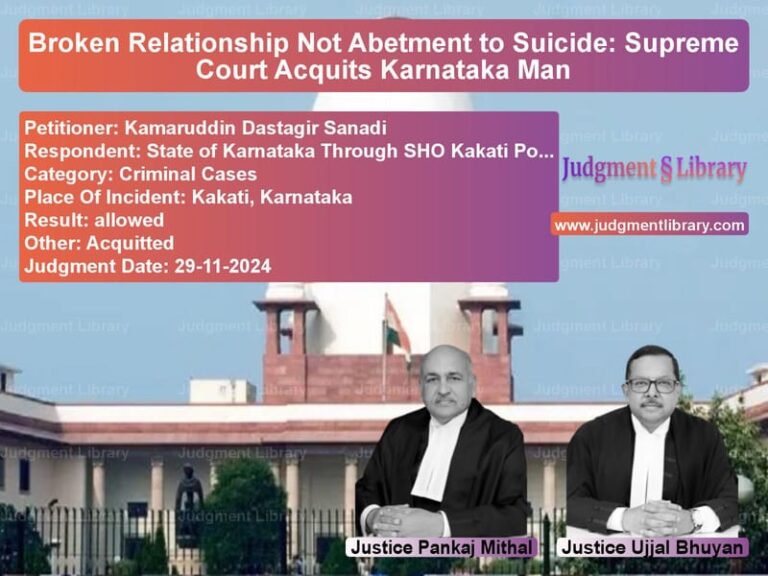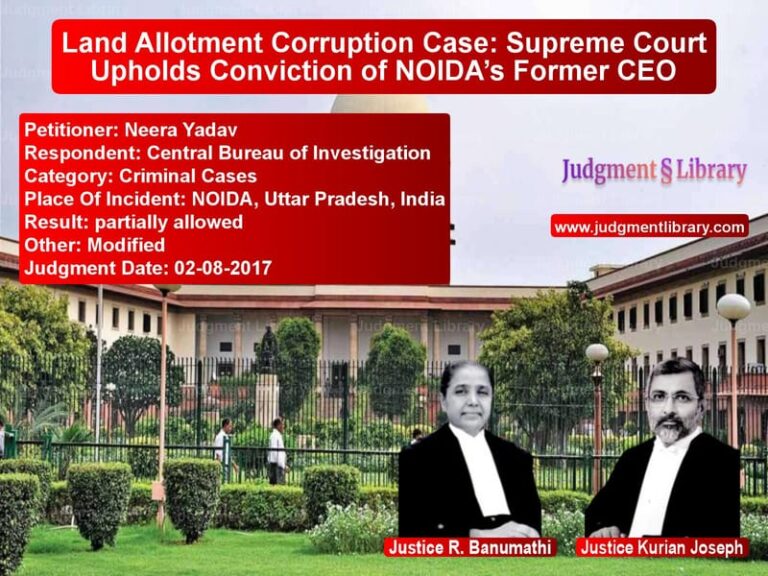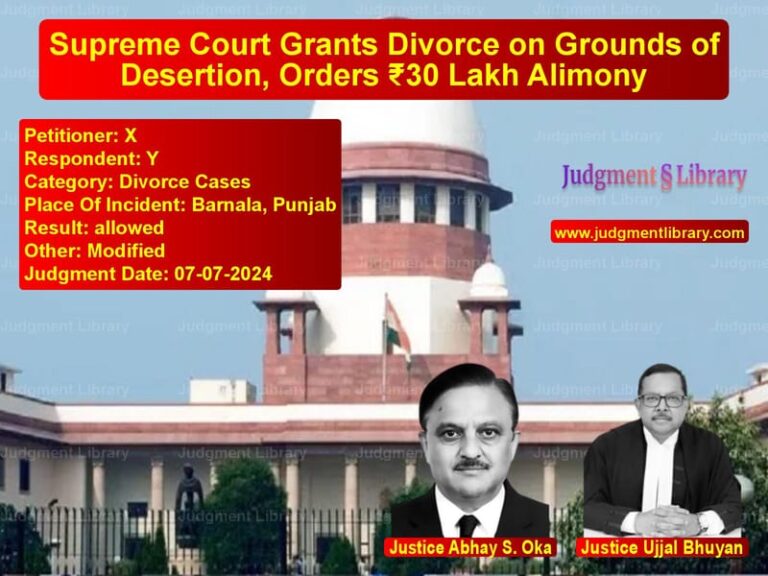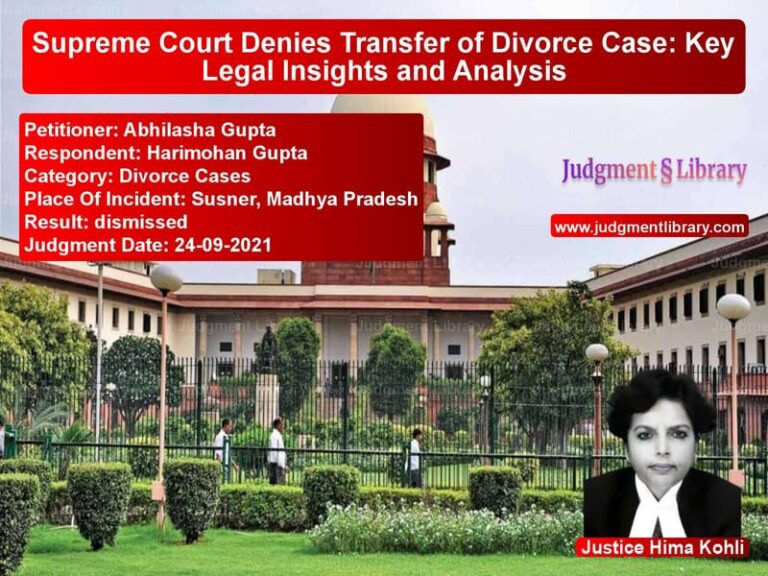Bombay Rent Act and Error in Law: Supreme Court’s Verdict on Review Petition
The case of Suhas Ramchandra Apte vs. Vasantrao Shankarrao Bhosle (Deceased) Through LRS dealt with a significant legal issue concerning the application of the Bombay Rent Act, 1947. The Supreme Court addressed whether the High Court had relied on an incorrect legal provision that was not applicable to the State of Maharashtra. The judgment primarily revolved around an alleged judicial error in applying Section 11(3) of the Bombay Rent Act and the legal recourse available to correct such an error.
The dispute originally arose in 1977 and had been through multiple levels of litigation. The appellant, Suhas Ramchandra Apte, challenged the High Court’s decision, arguing that the provision used in the ruling was applicable to Gujarat and not to Mumbai, Maharashtra. The Supreme Court’s ruling clarifies the procedure for reviewing such an error and sets a precedent on judicial review in cases where the wrong statutory provision is applied.
Background of the Case
The legal dispute pertained to a tenancy issue governed by the Bombay Rent Act, 1947. The appellant claimed that the High Court had mistakenly applied Section 11(3) of the Act as applicable in Gujarat, rather than the version applicable to Maharashtra. This resulted in an adverse judgment against the appellant.
The Bombay Rent Act, 1947, was enacted to regulate the conditions of tenancy and the rights of landlords and tenants. While the Act was originally applicable to the entire Bombay State, its application varied after the reorganization of states, leading to different versions in Gujarat and Maharashtra.
Following the High Court’s ruling, the appellant approached the Supreme Court, contending that the judgment suffered from an “error apparent on the face of the record” and that the High Court should correct the mistake through a review petition.
Arguments by the Petitioner
The appellant, represented by his legal counsel, presented the following arguments:
- The High Court had applied Section 11(3) of the Bombay Rent Act as applicable to Gujarat, which was legally incorrect.
- The Bombay Rent Act, as applicable in Maharashtra, had a different provision, and the High Court’s reliance on the Gujarat version led to a flawed judgment.
- The mistake constituted an “error apparent on the face of the record,” warranting judicial correction.
- The High Court should be given an opportunity to review its judgment and pass an order in accordance with the correct legal provision.
Arguments by the Respondent
The respondent, Vasantrao Shankarrao Bhosle (deceased) through legal representatives, opposed the appeal, arguing:
- The judgment had already been decided by the High Court, and reopening the case would cause further delays.
- The alleged error, if any, should have been raised at an earlier stage.
- The scope of a review petition is limited, and the case had already gone through extensive litigation since 1977.
- There was no significant difference in the provisions applicable to Gujarat and Maharashtra that would change the outcome of the judgment.
Supreme Court’s Observations
The Supreme Court bench, comprising Justice Kurian Joseph and Justice R. Banumathi, analyzed the facts and legal provisions. The Court observed:
“According to the learned counsel for the appellant, Section 11(3) of the Bombay Rent Act, 1947, as applicable to the State of Gujarat, has been followed in the instant case whereas Section 11(3) that is applicable in Mumbai is different. If that be so, it is an error apparent on the face of the record, which the High Court should correct at the first instance.”
The Supreme Court recognized the need for judicial correction in cases where an incorrect provision is applied. It ruled that:
“If the appellant is able to satisfy the High Court that the High Court has followed a provision which is not applicable to the State of Maharashtra, needless to say, appropriate orders for recalling the judgment and passing a fresh judgment in the light of the applicable provisions will be rendered.”
Legal Principles Affirmed
The Supreme Court’s ruling reaffirmed several important legal principles:
- Review of Judicial Errors: Courts have the power to review their own judgments if an error is apparent on the face of the record.
- Correct Application of Statutes: Judicial decisions must be based on the correct legal provisions applicable to the jurisdiction in question.
- Fairness in Legal Proceedings: If a party demonstrates that an incorrect law was applied, they must be given an opportunity to seek correction.
Conclusion
The Supreme Court disposed of the appeal with the direction that the appellant could file a review petition before the High Court within 30 days. The Court requested the High Court to decide the review petition expeditiously, preferably within three months.
This judgment is significant as it upholds the right of litigants to seek correction of judicial errors. It also reinforces the importance of courts ensuring that the correct statutory provisions are applied, particularly in cases where state-specific laws may differ.
Don’t miss out on the full details! Download the complete judgment in PDF format below and gain valuable insights instantly!
Download Judgment: Suhas Ramchandra Apt vs Vasantrao Shankarrao Supreme Court of India Judgment Dated 09-08-2017.pdf
Direct Downlaod Judgment: Direct downlaod this Judgment
See all petitions in Property Disputes
See all petitions in Landlord-Tenant Disputes
See all petitions in Judgment by Kurian Joseph
See all petitions in Judgment by R. Banumathi
See all petitions in Remanded
See all petitions in Remanded
See all petitions in supreme court of India judgments August 2017
See all petitions in 2017 judgments
See all posts in Civil Cases Category
See all allowed petitions in Civil Cases Category
See all Dismissed petitions in Civil Cases Category
See all partially allowed petitions in Civil Cases Category







